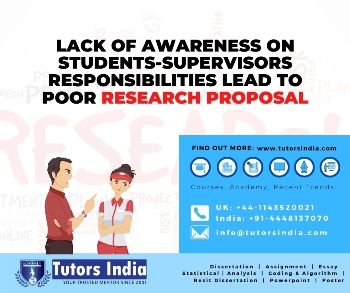Lack of Awareness on Students-Supervisors Responsibilities Lead to Poor Research Proposal
In-Brief
- To make a responsiveness amongst students and supervisors about their duties in making a dissertation research proposal.
- The identification and formulation of objectives towards a specific problem must be done in an appropriate manner in any research proposal writing.

Introduction
Dissertation research proposal writing is indeed essential for any student who wish to be engaged in research. In fact, the primary stage of research starts with identifying the research area and preparing a proposal on the topic chosen. An organized proposal is mandatory so that it is approved by the designated committee. A proposal is constructed as a group of sections containing theoretic/ hypothetical background, objective, a set of questionnaire that provide solution to the focused problem, a narrative and validation of technique involved to accomplish the goal, and inference. The supervisor is supposed to refer various literatures to authenticate the methods available and guide to include innovations on the feasible technique. In that case, the responsibility has to be borne by both the student and the supervisor. Also, they must be conscious about the research ethics. A proposal seeking any funding from agencies/organizations should also include a clear budget inclusive of contingencies. Moreover a time-chart should be added to assess the probable finishing time of the research. It is noticed out of experience that students face troubles while writing a research/ thesis proposal as they do not figure out the vital components of a proposal. It is also found that the lack of awareness on students as well as supervisors on how to write a proposal simply leads to rejection. This article emphasizes on the key elements of good research proposal.
Topic of research
As mentioned earlier, the crucial part of research proposal is finding an appropriate research topic. But then literatures may not be explored as such for choosing a topic rather it has to be derived from the range of interest. The students for this purpose can explore the literatures on the wider subject areas of their interest. They should analyze the available problem in a particular domain, understand the methodologies/technologies used, investigate the negativities or limitations of the methods applied , identify the part of the problem left-out in a particular research and acquaint themselves with the subject field. Afterwards, they can compress the subject area leaving the widely accessed portions where there is no scope of improvement. Then, they can expand on the methods/techniques which may possibly be applied for the problem in a better way. Finally, they can add new methods with the existing methods or they can find similar new methods to improvise the result. The wide subject area will now condense to a needy problem of current scenario with novel methods. The student then should seek the help of the supervisor about the feasibility of the method through discussion. Thus, the topic of research in present trend can be identified and consolidated by the student and supervisor.
Objectives and Questionnaire
The next significant stage is setting clear goals for the research. In order to attain the prime objective, a few small-term goals may be fixed. By doing this, we could progress in a streamlined manner. This could perhaps satisfy the supervisor about the work progress of the student. The small-term goals may be formed as questionnaire so that it is in a presentable format. The committee who looks into the questionnaire will understand the nature and possible progress of one’s work. The questions that are formed should be concrete and substantiate the dissertation work and should convey a perception to the supervisor and the committee in such a way that the research must be carried out. Literature exploration is must in every stage or section of thesis /dissertation research proposal, which would add value to the entire research. It is like learning/knowing by the experience of other’s experiences. The questionnaire of other proposals similar to the intended research may be explored to get an idea of how to frame the questions but definitely new and relevant questions are to be defined to authenticate the new research.
Techniques/Methodologies
The important next stage is the knowledge towards the present trend. Though we have similar problems the technology or methodology what we apply could make our work innovative. And definitely, one particular method will not suit a specific problem under all constraints. So, a thorough investigation on various new techniques is needed for successfully achieving the objective. In most of the cases, more than one particular method can be suggested or more methods can be hybridized or combined to give a better solution. The method well suiting for a particular situation should be properly stated in the research proposal. All the constraints or boundaries under which the research is to be carried out is to be visibly specified. This is not only enhancing the quality of the research but also provides scope of improvement of one’s research at various stages or by various researchers. In this stage, the data collection and analysis may be added pertaining to the research. The technique or method adopted will definitely improve the final quality of the proposal. It is the technique/method which offers space for narration and improvement.
Research Ethics
Even though, there are many ethics related to research, the plagiarism and authorship are the main concerns. Once, the research proposal is well structured, before submitting the committee, the plagiarism of the writing should checked with the help of the supervisor in order to avoid potential rejection. There are many tools and mechanisms available to check the similarity of the content written and one of such reliable tool may be used to refine the proposal work with negligible similarity. While writing dissertation proposal at Master’s level, sometimes more than one person will be involved. In such a situation, the agreement with co-author should be clearly defined. Also, if any statistical or other data are being used for research there should not be any fabrication or falsification, which will make the students’ repute in stake. Though the ethics part is not going to affect the work progress, this is the most important component in legal aspect and it makes the work undisputed. Moreover, the recommendation committee might have framed a set of rules relating to research ethics, which cannot be violated at any point of time. The overall general structure of flow of research proposal is illustrated through the flow-diagram shown in Fig.1.
Fig.1. Research Proposal Writing: Flow Diagram
After suitably sequencing the various sections of the dissertation proposals with the help of the supervisor and similarity checking of the writing the same must be submitted to the committee for recommendation. The writing should also contain a conclusion part stating the apparent work progress and should include the inference.
Conclusion
There are many responsibilities for the students who are likely to carry their research. The spine of the research is its proposal writing. Many struggle to submit a proposal due to lack of awareness on how to write it. The student and the supervisor should know one’s responsibility while writing a proposal without overburdening each other. There are stages in writing at which student and supervisor meet together to write and refine the writing. This article describes how a proposal writing to be progressed. It also throws light on the importance of selecting a topic that are presently in trend and of social/technical attention. It also emphasizes on how a major objective may be defined with a help of set of goals in questionnaire format.
References:
1. Magali, Joseph. (2019). Research Projects Writing Skills and Other Challenges Faced by Master and PhD Students at the Open University of Tanzania. International Journal of Social Science Research. 7. 41. 10.5296/ijssr.v7i1.14668.
2. Boyle, E. M. (2019). Writing a good research grant proposal. Paediatrics and Child Health. doi:10.1016/j.paed.2019.11.003
3. Attard, N. (2018). WASP (Write a Scientific Paper): Writing an academic research proposal. Early Human Development. doi:10.1016/j.earlhumdev.2018.04.011
4. Gillespie, G. L., & Moon, M. (2020). Finding Funding Support for Your Dissertation Research or Clinical Practice Project. Journal of Emergency Nursing, 46(2), 263–265. doi:10.1016/j.jen.2019.11.002
5. Starfield, S., & Paltridge, B. (2018). Thesis and dissertation writing in a second language: Context, identity, genre. Journal of Second Language Writing. doi:10.1016/j.jslw.2018.10.002
6. Ma, L. P. F. (2017). Academic writing support through individual consultations: EAL doctoral student experiences and evaluation. Journal of Second Language Writing. doi:10.1016/j.jslw.2017.11.006

 Previous Post
Previous Post Next Post
Next Post